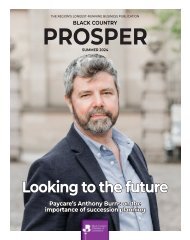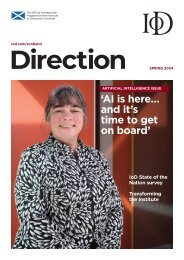IoD Scotland Autumn 2021
Institute of Directors Scotland, business magazine, directors
Institute of Directors Scotland, business magazine, directors
You also want an ePaper? Increase the reach of your titles
YUMPU automatically turns print PDFs into web optimized ePapers that Google loves.
Actionable insights<br />
n Set transparent goals – as board directors, hold<br />
yourselves accountable and measure progress<br />
n Set out your values on sustainability and the<br />
environment – and then recruit against them to<br />
ensure you have a team of like-minded people<br />
n ESG – think of it in the same way as you think of<br />
financial reporting; look at your energy, water and<br />
waste every month at board level as part of your<br />
oversight responsibilities<br />
Session chair<br />
Patrick Macdonald,<br />
Chair, <strong>IoD</strong>:<br />
“It feels like we<br />
are crawling in a<br />
direction we should<br />
be sprinting in.”<br />
Business leaders warned to<br />
ignore ESG at their peril<br />
Today’s business leaders will be held<br />
accountable to the next generation<br />
for their actions – and this demands<br />
a vigorous response to the threat of<br />
climate change.<br />
That was the view of the second<br />
Conference panel session, which<br />
brought together Jojo Mehta, Chair<br />
of the Stop Ecocide Foundation; Tony<br />
Wines, Turnkey Group; Prof David Hillier,<br />
University of Strathclyde Business School;<br />
and Jill Farrell, Zero Waste <strong>Scotland</strong>.<br />
Prosecute ecocide<br />
Jojo Mehta had the strongest<br />
words on the issue. Her organisation<br />
is promoting the concept of making<br />
‘ecocide’ – unlawful or wanton acts<br />
committed with knowledge that there<br />
is a substantial likelihood of severe,<br />
widespread or long-term damage to the<br />
environment being caused by those acts<br />
– a crime, with directors held personally<br />
responsible for their companies’ actions.<br />
This went far beyond current health<br />
and safety or corporate liability laws<br />
and was increasingly likely to be added<br />
to legal frameworks around the world –<br />
within 10-15 years, Jojo believed.<br />
She was highly critical of current<br />
economic models: “Too much of how<br />
<strong>IoD</strong> <strong>Scotland</strong><br />
Chair Aidan<br />
O’Caroll with<br />
panellists Jojo<br />
Mehta, Professor<br />
David Hillier,<br />
Tony Wines and<br />
Jill Farrell<br />
we operate is based on a model that<br />
threatens sustainability. We need to end<br />
the linear model that places no price on<br />
the cost of losing finite natural resources,<br />
and promote a circular economy.”<br />
She asked why society placed such<br />
a high value on ‘ownership’ of goods<br />
which were rarely used, when leasing/<br />
hiring everything from capital equipment<br />
and car fleets to the DIY equipment<br />
that gathers dust in your shed may be<br />
a better solution, both financially and in<br />
regard to production costs and use of<br />
natural resources.<br />
ESG at top of agenda<br />
Tony Wines was keen to see more<br />
directors promote a strong ESG agenda<br />
at every board meeting. The importance<br />
of ESG (Environmental, Social and<br />
Governance) had increased hugely in<br />
recent years, though many businesses<br />
were struggling to apply its principles to<br />
their actions.<br />
“Transparency of your processes is<br />
critical,” he said. “Look at ESG reporting<br />
the same as you do financial reporting,<br />
adding it to board agendas and setting<br />
strong metrics to measure progress.<br />
Look at your energy use, waste and<br />
“We need to end linear<br />
models that place no price<br />
on the cost of losing finite<br />
natural resources...”<br />
Jojo Mehta<br />
water every month and track reductions.”<br />
He saw huge opportunities for<br />
businesses to promote their ESG to their<br />
stakeholders.<br />
Be active in good times and bad<br />
ESG tasks us to generate financial<br />
returns as well as positive societal<br />
impacts, said Professor Hillier, and he<br />
reinforced the need to think of your<br />
organisation’s ESG in bad times as well<br />
as good. Too often financial crises see<br />
issues such as sustainability jettisoned<br />
in favour of a race for profit; that’s a<br />
philosophy that needs changing for a<br />
constant focus on a triple bottom line –<br />
people, planet and profit.<br />
Investors support<br />
Investors were clearly swinging behind<br />
businesses with strong ESG performance<br />
and Jill Farrell reiterated how the first<br />
steps were easy to take. “There is plenty<br />
of low hanging fruit,” she stressed: “cut<br />
waste and energy, use renewable energy<br />
and switch your transport to electric<br />
cars.”<br />
But go deeper; look across your supply<br />
chain to ensure suppliers are following<br />
similar paths. “Some businesses respond<br />
eagerly to zero waste ideas, motivated<br />
by interest, but others because of<br />
‘threats’ - from customers or suppliers.<br />
“You need a vision of why you are<br />
reforming your operations and bring<br />
your team with you.”<br />
There was a consensus that good<br />
governance is not good words, it’s<br />
good actions, and it was imperative<br />
for organisations to move away from<br />
a “lawful legitimation” of their current<br />
practices and take responsibility now.<br />
“Get ahead of the legal framework<br />
before you find yourself on the wrong<br />
side of the equation.”<br />
<strong>Autumn</strong> <strong>2021</strong><br />
iod.com<br />
33

















